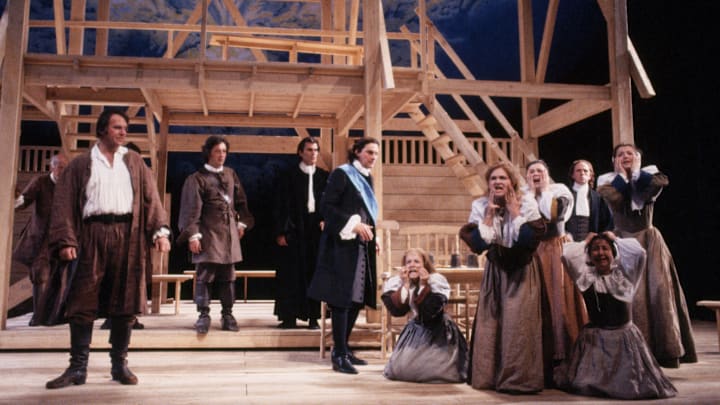While most people think of musicals when considering the great works of Broadway, it also has a rich history of performing plays, many of which have become integral parts of American literature. One of these works comes from 1953, directly in the middle of the Second Red Scare.
71 years ago, Arthur Miller's play The Crucible premiered at the Martin Beck Theatre. The play provided a powerful allegory about the betrayal inherent in social paranoia, which remains one of the dominant perspectives when looking back on Cold War-era society.

How did the Cold War inspire The Crucible?
Arthur Miller always included modern political problems in his works, but they became more personal as the fear of Communism spread throughout the entertainment industry. While Hollywood was a hotbed for McCarthyism—widespread accusations and blacklisting for anybody who might have been sympathetic to communism—it was also present in New York, where writers and directors could lose their careers if they appeared too obviously left-leaning.
According to his obituary, one of the most significant moments in his life was when his friend Elia Kazan was questioned by the House Un-American Activities Committee. The man had given in to the pressure, providing names of other leftists who might be interested in Communism. Miller promptly traveled to Salem, Massachusetts to begin work on a new play.
One of Miller's primary sources was Salem Witchcraft by Charles W. Upham, a former mayor of Salem who had detailed the Witch Trials from multiple angles, including the petty squabbles that ended in fatal accusations. There, he found the romantic core of his play in the dynamic between John Proctor, Elizabeth Proctor, and Abigail Williams.
An affair was an incredibly personal, and relatable core to the story, but it also showed how dangerous such things could be. If the Witch Trials were truly caused by rivalries, could people really be sentenced to death for an affair? More so, could an affair prompt suspicions of Communism in the modern day?
"The more I read into the Salem panic, the more it touched off corresponding images of common experiences in the fifties: the old friend of a blacklisted person crossing the street to avoid being seen talking to him; the overnight conversions of former leftists into born-again patriots; and so on."Arthur Miller
While the play does include factual events from the witch trials, the environment it was produced in is woven throughout. Themes of accusation, betrayal, and honor are all intended as commentary on McCarthyism and how it caused people to turn on each other with the slightest provocation.
What was The Crucible about?
On the surface, The Crucible follows the story of John Proctor, one of the victims of the Salem Witch Trials. His lover, Abigail Williams, is the ringleader of the girls making accusations of witchcraft, and while John initially sees it as little more than a cruel game, it becomes increasingly dangerous when those convicted of witchcraft are killed.
Soon enough, it turns personal as his wife is accused of witchcraft. He assumes truth will win out, but finds that admitting to the affair only places him in the crossfire. In the end, John Proctor has to decide whether to confess to witchcraft in the hopes of being freed or face his execution, knowing he embraced the truth, no matter where it took him.
"What I sought was a metaphor, an image that would spring out of the heart, all-inclusive, full of light, a sonorous instrument whose reverberations would penetrate to the centre of this miasma."Arthur Miller
When looked at as an metaphor, the play was truly about the conflict a person felt when they were forced to sacrifice others for the sake of themselves. His disappointment in Elia Kazan is palpable, as the heroes of the work all refused to comply with the court.
Miller went on to compare the attacks on Monica Lewinsky in the 90s to the Salem Witch Trials, showing that he felt there were parallels whenever a person was attacked for political means.

How was The Crucible received?
Although the first performances of The Crucible didn't get much attention, it won the 1953 Tony Award for Best Play and found great success when it was revived just a year later.
Shortly after the play premiered, Miller faced the House Un-American Activities Committee himself, under suspiscion of Communism. When he refused to provide names of other possible Communists, he was found to be in contempt of Congress. He was denied access to a passport, fined, and spent a brief time in prison.
According to Arthur Miller in his essay "Journey to 'The Crucible'":
"It will be a long time before I shall be able to shake Rebecca Nurse, John Proctor, Giles Corey and the others out of my mind. But there are strange, even weird memories that have connected themselves to this play, and these have to do with the present, and it has all got mixed up together."Arthur Miller
Miller's fear of the Red Scare had led his play to come true in more ways than one. As the political landscape became less volatile, however, the play became acknowledged as one of the most important political critiques in American history.
Primary sources about McCarthyism are available through the Eisenhower library.
Check back for more segments of "This Day in History" on Ask Everest.
